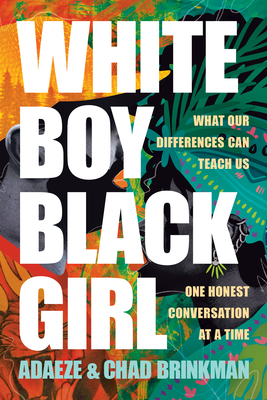Book Review: White Boy/Black Girl: What Our Differences Can Teach Us, One Honest Conversation at a Time
Reviewed by:
Eryka ParkerThe recently published White Boy/Black Girl: What Our Differences Can Teach Us, One Honest Conversation at a Time by Adaeze and Chad Brinkman is a thought-provoking memoir that delves into the complexities of religion, relationships, and social issues and examines the topics through the lens of an interracial couple. Featuring the perspectives of a Black Nigerian-American woman and a White man who identifies being from “the upper-left USA,” this book offers an intimate look at their individual and collective journeys toward greater personal awareness and understanding of how their individual experiences with race in America impact how they show up in their relationship.
The couple currently lives in Colorado; Adaeze works in the creative arts and Chad is a physical therapist. Through personal narratives presented in a conversational format, Adaeze and Chad share their unique experiences with race, revealing how their lives and perceptions have both collided and overlapped. While navigating honest and often challenging topics, Chad becomes more aware, emotionally attuned, and committed to being an ally for Adaeze. Meanwhile, Adaeze learns to articulate her needs and observations, finding ways to create a safer space for herself within their interactions and in the broader world.
Regarding well-intentioned comments or questions from loved ones that land wrong, Chad states, “That’s why Adaeze and I are writing this book—to hold up a mirror and help all of us see some of the blind spots that get in the way of healthy relationships with people who don’t look like us.”
The Brinkmans also provide practical tips on how readers can broaden and diversify their networks. Their suggestions include engaging with minority business owners and supporting minority-owned businesses; joining cultural resource groups; and visiting ethnically diverse communities, museums, music and film festivals. These actions are aimed at breaking down stereotypes and overcoming negative influences that perpetuate division.
White Boy/Black Girl is divided into eleven chapters with titles such as “Let the Awkward Conversations Begin!” “Excuse Me, but I Think You Just Stepped in Something,” and “Celebrating What We Don’t Understand.” While the book can be a resource for nonminority individuals in interracial relationships seeking to be empathetic, understanding, and supportive, the book does have some limitations. The memoir primarily focuses on Chad’s learning curve and his efforts to become a better ally, which at times feels one-sided. Examples shared in the book showcase how Adaeze often retreated emotionally or became critical when Chad made mistakes, such as using incorrect language or failing to advocate for her, both in her presence and in her absence. There were some missed opportunities to demonstrate how minorities can also be patient, understanding, and supportive as their partners strive to become allies.
At moments, the narrative felt imbalanced, with more emphasis on Chad’s journey rather than a mutual growth process. For example, there were multiple stories about Adaeze’s encounters with Chad’s friends and family, but none about Chad meeting Adaeze’s loved ones. There were also multiple conversations about how Chad missed the mark by failing to defend Adaeze when she was feeling left out, overlooked, or unsafe in racially charged incidents. The memoir would have benefitted from more examples of how the couple could lovingly teach each other, demonstrating that both partners in an interracial relationship have valuable lessons to learn and share.
Toward the end of the book, in the chapter “Down the Rabbit Hole,” Adaeze addresses concerns about teachable moments by stating, “I need to give Chad the same respect, love, and empathy I need from him… [a white person is] constantly trying to figure out where it’s safe to step and where it’s not and what’s okay to say or ask while avoiding land mines. This doesn’t negate my feelings, but it’s important for me to be aware of the other person’s perspectives.” For me, it would have been valuable to see more of these moments of transparency and self-awareness from her.
Overall, White Boy/Black Girl is an engaging and insightful read. It successfully highlights the importance of honest dialogue and mutual support in navigating the challenges of interracial relationships. The memoir, on the other hand, could have gone further in creating a more balanced platform where both partners are equipped with tools and knowledge to show compassion, respect, and patience as they navigate and recount their shared journey.


